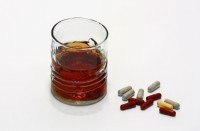Frontiers of Medicine: Would You Take "Don't Drink" Pills?

Here’s a pretty fascinating piece about treating alcoholism with pharmaceutical drugs. While a successful pharmacological cure does not yet exist, drug companies are starting to realize that there’s money to be made, and it seems like a matter of time before a magic bullet is discovered or created. The possibility of this kind of treatment engenders controversy: Is it appropriate to battle a chemical addiction with another chemical? Won’t the pharmaceutical companies “define alcoholism down” in an attempt to get the broadest possible consumer base for their products? Is life really worth living if you’re sober all the time?
My interest in this subject is more than academic. I am, obviously, someone who falls into the category of “functional alcoholic.” I drink a great deal. It has been several years since a day went by where I voluntarily went without at least one drink. In fact, it has been several years since a day went by where I voluntarily went without several drinks. This is slightly troubling for a couple of reasons, the very least of which is the nagging concern that I may be doing some sort of irreparable physical damage. There’s a terrifying passage in Andy Beckett’s When the Lights Went Out: Britain in the Seventies where Beckett talks with Joe Stone, who served as Prime Minister Harold Wilson’s GP. By the time of his final term in office, Wilson’s drinking was having a very noticeable effect. Says Stone:
Heavy drinking cuts off one layer of your thinking. You lose sharpness, facts, precision. And it’s the sign of someone who’s burning out.
I feel this. It is perhaps the most motivating factor I might have to cut back on my consumption; the idea of losing whatever small functional edge I have mentally horrifies me.
One of the arguments against a medicine-based treatment of alcoholism is that while it may certainly curtail the physical addiction it does nothing to address the underlying reasons why someone might choose to drink-anxiety, depression, an unwillingness to be in the world without some kind of sedating agent to take the edge off of existence. It is rather disturbing to think that the same edge one uses alcohol to blunt in life is the edge that is removed, bit by bit, through the constant consumption of alcohol.
On the other hand, I’m not unsympathetic to the argument that a certain amount of drinking is just fine. I know plenty of folks who drink almost as much as I do and manage to keep it all together. Why castigate their actions or make them think they need “treatment” for what could be considered just another lifestyle choice? I tend to dismiss my own worries about my drinking with a combination of compensatory humor and uncertain reassurances that when the time comes I will have no problem in cutting back, but that’s just me: There are many people who are nowhere near needing any assistance. Who are we to tell them different?
This is not meant to read as some kind of cry for help or monologue delivered at a meeting. Concerns aside, I am pretty sure I will continue to drink at the same clip I currently consume until something severe forces me to confront whatever issues I’m avoiding at present. And those of us who do drink know that there is almost nothing in this world so satisfying as the warming sense of satiation that slowly seeps through your body when that first rye Manhattan slips into your bloodstream and lets you know that everything is going to be okay. I guess, though, if there’s an option for some kind of pill-based treatment, I’d like for it to be on the table. It’s not exactly a ringing endorsement, but there you are. Cheers.
